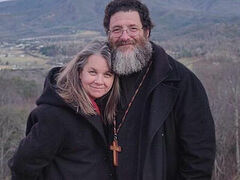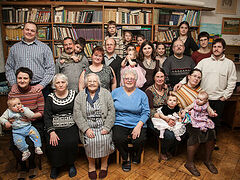—Fr. Artemy, students from the Samara Seminary once asked you: “What should we do to find good wives?” So, what can men do to find good wives?
—It seems it was easier then than now, because fifteen or twenty years have passed since I visited Samara. At that time, young people still understood the phrases “eligible bachelor” or “marriageable girl.” Although they sounded somewhat old-fashioned even then, they still seemed to have the ideal of family life behind them, when a young man in search of love considered it natural that friendship should end in nothing but matrimony, marriage.
I’m an optimist, and my optimism is based on the fact that those who want to take the burning candles of sacrificial love into their hands still approach priests about it. Sometimes you’re amazed how similar the bride and groom are. It’s amazing how in this great big world, the two halves of one whole find each other! I can find only one answer: The hand of God—marriage is concluded in Heaven. Therefore, finding a companion in life is not just a fruit of your activity. Happiness, they used to say, must be obtained by prayerful entreaties.
Marriage is fullness, in relation to which each one of us is a half, however flawed. And the most important thing here is fervent faith in the Savior, Who unites the hearts of the married couple as soon as they voice their answer, their vow of mutual fidelity and love.
If the heart of at least one of the spouses is warmed with living prayer to the Lord and the Most Holy Theotokos, I’m convinced there is no trouble or misfortune that it would be impossible to handle if this enlightened half helps his companion endure everything with hope in Christ. If I comprehend my family life, if I understand that caring for my family is an expression of love for God, can any such circumstances really arise that force me to leave the field of battle, to throw down my sword and shield in the midst of battle, and turn my back on my home, my children, and the one whom I once told, “I love you?”
It’s not enough to get married—it’s important to have a relationship with the Mother Church. If our husbands came to the priest once a week or once every two weeks for a medical examination, tracked their thoughts, and revealed their secret sins, then no Trojan horse would be able to enter into the family, and the spouses would, twenty or forty years later, look at each other if not with amorous eyes, then with joy and gladness, thanking God that He brought them together in this world.
—The creation of a family is such a vital issue, but often this decision is made without any careful consideration, but based on the draw of the heart. How can we explain such frivolity?
—We can’t completely exclude the heart from the mystery of coming together. “I remember a wondrous moment, as before my eyes you appeared.”1
I would like to reflect upon this question. Why, having fallen in love, or at least thinking he’s fallen in love, does a man, a bit rough around the edges, become gentle, gallant, giving flowers? His face, once savage, is illuminated with a childlike smile, grinning wide with compliments for her. And at the same time, at home, with his mother, brother, and friends, he remains a bit rude, boorish; he speaks curtly, his face is completely unkind. Why such a double standard? Is it possible for the human heart to both love and be impudent at the same time? What is the object of his love? Does he love her? Or does he satisfy himself with some biological impulse of the soul, seeing her as simply an outlet for the forces that animate him? Loving her, he uses her and is possessive of her. “I can’t live without her!”—this is actually indulging in one’s own ego and not-so-exalted desires.
So what is the criteria that helps us distinguish genuine love? Selflessness, of course! A good person is not someone who feels good, but someone with whom you feel good. And if you have truly fallen in love and love has entered your life, it will certainly have a beneficial effect on your moral disposition. Having fallen in love with her, you feel like the happiest person and you want to share your joy with your younger brother and your mother. If love is truly given to us from God, then we, learning love from each other, are called to broadcast, to transfer this state that warms us to all both near and far. This is why an Englishman once said: “True charity beginneth first at home.”2
—Probably the most important point in the Wedding service is when the priest leads the couple around the analogion while the choir sings “O Holy Martyrs.”3 Young couples usually don’t pay much attention to this hymn; they think that nothing but happiness awaits them… Why do we sing “O Holy Martyrs” at a Wedding?
—I think it’s because in our time, preserving oneness of heart and mind, preserving harmony is a martyric work demanding intelligence, patience, humility, purposefulness, and the exertion of all a man’s spiritual powers. It’s much easier to turn into a cat and dog after the wedding, to clash like a knight of the White Rose and the Mistress of the Copper Mountain,4 sparking off each other through offensive, ironic, and bristling words. And conversely, to be able to not succumb to provocations, to soften sharp edges, to answer a sharp word with thoughtful silence while secretly praying: “Lord, soften my husband’s heart; give him grace.” To smile when your loved one is frowning and withering, breathing vital optimism and energy into him—this is the most difficult path, comparable to a real ascetic feat.
—For some reason fairytales always seem to end with a wedding feast. Can there not simply be a fairytale about a fisherman and a fish or a capricious princess?
—Russian fairytales indeed often lead to this climax and then abruptly end. It used to be that the heroes of family life didn’t have time to fall in love with each other, but since everything was cultivated in them—both humility and a thirst for creating something godly, as soon as they had the wedding, God’s grace descended upon them and life flowed on peacefully. The traditions forged over millennia didn’t envision any other way of life. It was a union that unfolded over the years like a mustard seed growing into a tall, mighty tree, in whose branches dwelt the birds of the air.
Love is confirmed and strengthened by small actions, words, or looks. Tsarina Alexandra Feodorovna, who left us a whole diary about family life, says you have to plant love like a garden, seed by seed, stem by stem, cultivating care, tenderness, tact, and words backed up by deeds.
—Where does dissatisfaction in marriage come from?
—Nowadays, people are distinguished by the fact that they accumulate negativity in their hearts. But the wiser a man is, the closer he is to God, the shorter his memory is for all kinds of resentments. Every day he thanks his Creator for both sorrows and joys, thereby expanding the scope of his positive emotions. He is calm, joyful, and peaceful.
Imagine, people haven’t even lived together for half a year yet and they’re already starting to notice flaws, and a casual remark becomes a mountain out of a molehill. What kind of satisfaction is there if they both resemble a live wire?! Like two roosters, they jab at one another, turning the paradise of family life into the first circle of Hell.
Thus, we must learn to be good-natured, to be able to see the bright side in everything.
In marriage, there is a mutual fleshly expression of love, an attraction to each other. And dissatisfaction with marriage arises immediately when people do everything possible, even mutilating themselves to abolish fatherhood and motherhood, becoming potential murderers, waging battle against the life that is given to us.
—Can humble acceptance of ordinary life be considered an ascetic feat?
—The Russian theologian Alexei Stepanovich Khomiakov considered it so. There is a feat of combat, in battle, and there is also the feat of service in everyday life. The vessel of family happiness will never crash against the rocks of daily life if we poeticize our daily life; if we strive to make our home a Heavenly tabernacle, if we permeate it with an atmosphere of love and warmth, if we generously share the happiness about which God Himself says: “Where two are crowned in matrimony in My name, there am I among them” (cf. Mt. 18:20).
—What distinguishes a happy family from an unhappy one?
—Happy spouses are good together. They can just be silent; they don’t need to constantly talk, because the quiet angel who overshadowed them in the hour of their Wedding still stretches his wings over them. A happy family is, of course, the family that God has rewarded with children. However, spouses can also be childless—different fates, their divine lot. However, where the home is filled with children, where there is laughter, where the parents receive revelations from the children—because the truth often speaks through the mouths of babes—there is happiness. A happy family is where there is a candle burning before the image of the Most Holy Theotokos. I think the happiest moment for spouses is when they pray together in the morning, giving thanks for the past night and asking for a blessing for the day that has begun. A happy family is ready to joyfully share what God has sent them with friends in the faith.




